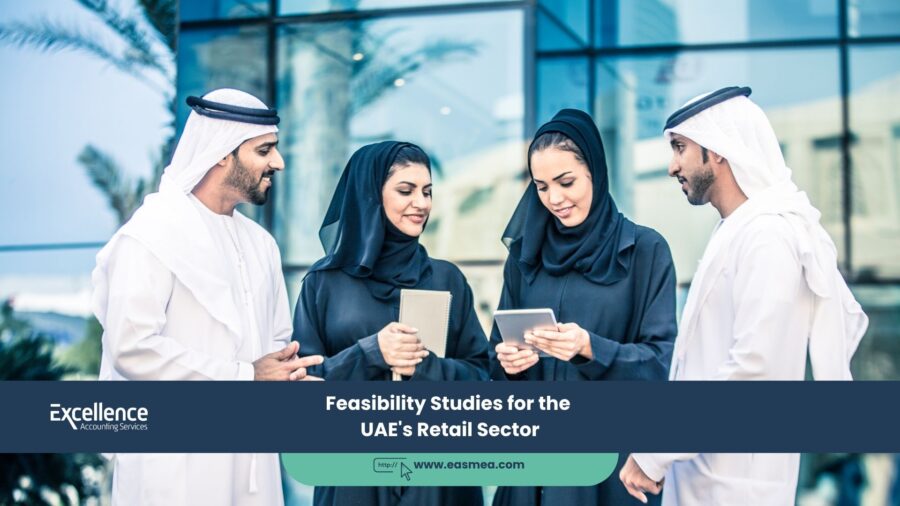A Founder’s Guide to Feasibility Studies for the UAE’s Retail Sector
The UAE’s retail sector is a global powerhouse, characterized by iconic shopping malls, a diverse, high-spending consumer base, and a dynamic blend of luxury brands and innovative local concepts. For entrepreneurs and investors, it presents a landscape of immense opportunity. However, it is also a fiercely competitive and rapidly evolving market. Launching a new retail venture—be it a boutique, a specialty food store, or an e-commerce platform—without a thorough, data-driven plan is a recipe for failure.
This is where a feasibility study becomes the most critical first step in your journey. It is not merely a business plan; it is a rigorous, objective assessment of your proposed venture’s viability. A well-executed feasibility study acts as a stress test for your idea, scrutinizing its potential from every angle: market demand, financial viability, operational requirements, and legal compliance. It is the tool that transforms a promising idea into a bankable project.
This guide will walk you through the essential components of a feasibility study tailored specifically for the unique characteristics of the UAE retail market. We will explore how to analyze the market, forecast financials, assess operational needs, and navigate the legal landscape. Understanding these elements will not only help you make an informed “go/no-go” decision but will also provide a foundational blueprint for your business strategy, financing proposals, and operational setup.
Key Takeaways
- A Feasibility Study is a Prerequisite for Success: It is an essential risk management tool that validates your retail concept before significant capital is invested.
- Market Analysis is Paramount: Understanding your specific target audience, niche, competition, and ideal location within the UAE is the foundation of a viable retail business.
- Financial Projections Must Be Realistic: A credible study requires detailed, bottom-up financial forecasts, including startup costs, operating expenses, and revenue projections, to determine profitability and funding needs.
- Operational Viability is Key: The study must address the practicalities of supply chain, logistics, staffing, and technology required to run the business effectively in the UAE.
- Legal & Regulatory Compliance is Non-Negotiable: Understanding the requirements for company formation, licensing, and industry-specific regulations is crucial for operational legitimacy.
The Core Pillars of a Retail Feasibility Study in the UAE
A comprehensive feasibility study is structured around several key pillars of analysis. Each pillar answers a fundamental question about your proposed business’s potential for success.
1. Market Feasibility: Is There a Demand?
This is the most critical component. It assesses whether a real, sustainable market exists for your product or service in the UAE. This goes far beyond a general statement like “Dubai has many shoppers.”
- Target Audience Analysis: Who are your specific customers? Define them by demographics (age, income, nationality), psychographics (lifestyle, values, interests), and spending habits. The UAE’s diverse population means a “one-size-fits-all” approach rarely works.
- Competitive Landscape: Who are your direct and indirect competitors? Analyze their pricing, product range, marketing strategies, and customer reviews. What is your Unique Selling Proposition (USP) that will make customers choose you over them?
- Location Analysis (for brick-and-mortar): “Location, location, location” is still the mantra of retail. This involves analyzing foot traffic, accessibility, visibility, nearby businesses (complementary or competing), and rental costs. A spot in Dubai Mall has different dynamics than a community retail center in Sharjah.
- Market Size and Trends: What is the size of your specific niche? Is it growing, shrinking, or stable? Are there emerging trends (e.g., sustainability, wellness, experiential retail) that you can capitalize on?
A feasibility study doesn’t just ask if there’s a market; it defines exactly who is in that market, where they are, and why they would buy from you.
2. Technical & Operational Feasibility: Can We Build and Run It?
This section deals with the practical, logistical aspects of bringing your retail concept to life. It’s about the “how.”
- Supply Chain and Logistics: Where will you source your products? Who are your potential suppliers? What are the logistics of importing goods into the UAE, including customs, duties, and warehousing?
- Technology Requirements: What Point of Sale (POS) system will you use? Do you need an e-commerce platform? What about inventory management software? A robust accounting system implementation is crucial from day one.
- Staffing: What are your staffing needs, from sales associates to managers to administrative staff? What are the prevailing salary rates, and what are the legal requirements for hiring and visa processing in the UAE? This is where HR consultancy can be invaluable.
- Store Fit-Out and Design (for brick-and-mortar): This includes estimating the costs and timeline for designing, constructing, and furnishing your physical store to create the desired customer experience.
3. Financial Feasibility: Is it Profitable?
This is where the idea meets the numbers. The financial analysis determines whether the proposed venture can generate enough profit to be sustainable and provide a return on investment. This requires detailed, realistic projections.
- Startup Costs: A comprehensive list of all one-time expenses required to launch the business. This includes license and registration fees, rental deposits, store fit-out costs, initial inventory purchase, and marketing launch expenses.
- Operating Expenses: A detailed forecast of all recurring monthly costs, such as salaries, rent, utilities, marketing, software subscriptions, and insurance.
- Revenue Projections: A realistic, data-backed forecast of your sales. This should be a bottom-up calculation based on factors like expected foot traffic, conversion rates, and average transaction value.
- Break-Even Analysis: Calculating the point at which your revenue equals your total costs. This tells you the minimum sales you need to achieve to start being profitable.
- Profitability and Cash Flow Projections: Creating projected financial statements (Income Statement, Balance Sheet, Cash Flow Statement) for the first 3-5 years. This demonstrates the long-term financial health and is critical for securing funding. These projections form the basis of your future financial reporting.
4. Legal & Administrative Feasibility: Is it Permitted?
Navigating the legal framework of the UAE is a critical step. An idea is not feasible if it cannot be legally established and operated.
- Business Structure and Licensing: Determining the correct legal structure (e.g., Sole Establishment, LLC) and the appropriate jurisdiction (Mainland or a specific Free Zone). The choice impacts ownership rules, scope of activities, and taxation.
- Regulatory Approvals: Identifying any specific permits required for your retail activity. For example, a food retail business will need approvals from the relevant municipality’s Food Safety Department, while a pharmacy requires MOHAP approval.
- Tax Obligations: Understanding your obligations regarding VAT and the new UAE Corporate Tax. The study should factor in the costs of compliance and the impact of taxes on profitability.
How Excellence Accounting Services (EAS) Delivers Actionable Feasibility Studies
A feasibility study is only as good as the data and expertise behind it. At EAS, we provide comprehensive feasibility study services that give entrepreneurs and investors the clarity and confidence they need to make informed decisions.
- In-Depth Market Research: We go beyond surface-level data, conducting detailed market and competitor analysis tailored to your specific retail niche to accurately assess market demand and positioning.
- Robust Financial Modeling: Our financial experts build sophisticated, bottom-up financial models, providing credible projections for startup costs, profitability, cash flow, and key financial ratios. This is essential for both internal planning and securing external financing.
- Operational & Strategic Planning: We assist in outlining your operational requirements, from supply chain to technology, helping you create a practical and efficient business model.
- Comprehensive Business Consultancy: We guide you through the entire process, from ideation to a final, bankable feasibility report. Our expertise in the UAE business environment helps you navigate legal, administrative, and financial complexities.
- Support Beyond the Study: Our relationship doesn’t end with the report. We assist with company formation, accounting system setup, and ongoing financial management to help you launch and grow your business successfully.
Frequently Asked Questions (FAQs)
A feasibility study answers the question, “Is this a viable business idea?” It is an investigative tool used to determine whether to proceed with a project. A business plan answers the question, “How will we execute this viable business idea?” It is a strategic roadmap for a business that has already been deemed feasible. The feasibility study comes first and provides the foundation for the business plan.
The cost varies significantly based on the complexity of the retail concept, the depth of market research required, and the scope of the project. A study for a small, single-location boutique will cost less than one for a multi-location restaurant chain or a complex e-commerce platform. It’s best to view it as an investment in risk mitigation. The cost of a good study is a fraction of the potential loss from a failed business venture.
While you can certainly start the process, a truly objective and credible feasibility study, especially one used to secure financing from banks or investors, requires professional expertise. Professionals have access to market data, possess financial modeling skills, and, most importantly, provide an unbiased, third-party assessment of your idea, which is something an enthusiastic founder often struggles with.
Again, this depends on the scope. A straightforward study might take 3-4 weeks, while a more complex project requiring extensive primary market research could take 2-3 months. It’s important to allocate sufficient time for a thorough investigation.
This is a positive outcome, not a negative one. The study has just saved you a significant amount of time, money, and emotional distress. A “no-go” conclusion allows you to either pivot and modify your concept based on the study’s findings (e.g., change the location, target a different niche, adjust the pricing) or to abandon the idea and move on to a more viable opportunity.
In today’s market, it’s critically important. An omnichannel strategy is the new standard. Your feasibility study should analyze the potential for an e-commerce platform to complement your physical store. This includes assessing the costs of platform development, digital marketing, and the logistics of fulfillment, as well as forecasting online sales as a separate revenue stream.
No, it does not. No study can predict the future with 100% accuracy. However, it dramatically increases your chances of success by ensuring you are entering the market with a viable, well-researched, and financially sound plan. It helps you anticipate challenges and mitigate risks, which is the hallmark of smart entrepreneurship.
This is challenging but can be done through logical, defensible assumptions. You would research foot traffic data for your proposed location, find industry benchmarks for customer conversion rates (the percentage of people who enter a store and make a purchase), and research the average transaction value for similar types of businesses. Combining these data points (Foot Traffic x Conversion Rate x Average Transaction Value) gives you a bottom-up daily sales estimate.
Yes, this is a key part of the legal feasibility analysis. The study should compare the costs, benefits, and restrictions of setting up on the Mainland versus a relevant Free Zone (like Dubai CommerCity for e-commerce or a retail-focused zone). The choice impacts your ability to trade directly with the local market, ownership structure, and potential tax implications, all of which affect the overall feasibility.
The biggest mistake is “confirmation bias”—conducting the study with the sole purpose of proving that your beloved idea is brilliant. This leads to overly optimistic revenue projections, underestimation of costs, and ignoring negative market feedback. A successful feasibility study must be approached with a critical, objective, and investigative mindset, with a genuine willingness to accept the data, even if it contradicts your initial beliefs.
Conclusion: Your Blueprint for Retail Success
In the high-stakes world of UAE retail, intuition and passion are not enough. Success is built on a foundation of rigorous research, strategic planning, and financial acumen. A professional feasibility study provides this foundation. It is your insurance against costly mistakes and your blueprint for building a sustainable, profitable, and valuable retail enterprise.
By taking the time to thoroughly assess the viability of your vision, you are not delaying your dream; you are ensuring it has the best possible chance to become a reality.
Is Your Retail Idea Viable in the UAE Market?
The expert team at Excellence Accounting Services provides the in-depth analysis and financial modeling you need to make your next move with confidence. Contact us today to discuss your project.




